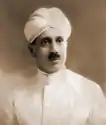Arunachalam Mahadeva
Arunachalam Mahadeva, KCMG (Tamil: அருணாசலம் மகாதேவா, romanized: Aruṇācalam Makātēvā; 5 October 1885 – 15 April 1966) was a Ceylon Tamil lawyer, politician and diplomat. He served as Minister of Home Affairs (1942-1946) and High Commissioner to India (1948-1949).
Sir Arunachalam Mahadeva | |
|---|---|
அருணாசலம் மகாதேவா | |
 | |
| Minister of Home Affairs | |
| In office 1942–1946 | |
| Preceded by | D. B. Jayatilaka |
| Succeeded by | Oliver Goonetilleke |
| Member of the Legislative Council of Ceylon for Western Province Tamil | |
| In office 1924–1930 | |
| Member of the State Council of Ceylon for Jaffna | |
| In office 1934–1947 | |
| Ceylonese High Commissioner to India | |
| In office 1948–1949 | |
| Preceded by | M. W. H de Silva |
| Succeeded by | C. Coomaraswamy |
| Personal details | |
| Born | A. Mahadeva 5 October 1885 Matara, Ceylon |
| Died | 8 June 1969 (aged 83) |
| Citizenship | British Ceylon |
| Nationality | British Ceylonese |
| Political party | United National Party |
| Alma mater | Christ's College, Cambridge |
| Profession | Lawyer |
Early life and family
Mahadeva was born on 5 October 1885 in Matara in southern Ceylon.[1][2][lower-alpha 1] He was the son of P. Arunachalam, a leading civil servant, and Sornambal.[1] He was educated at Royal College, Colombo where he won many prizes including the Turnour Prize.[1][2] After school he joined Christ's College, Cambridge, graduating with honours degree in mathematics.[1][2]
Mahadeva married Sivakami, daughter of M. Mootatamby, in 1918.[1][3] They had a son (Balakumar) and a daughter (Swarnam).[1][3]
Career
Mahadeva was called to the bar at Lincoln's Inn and on returning to Ceylon qualified as a barrister-at-law.[2] He joined the Attorney General's Department as a crown counsel.[1][2] He also practised law as an advocate at the unofficial bar.[2] He later served as principal of Parameshwara College, Jaffna, a boys school founded by his paternal uncle P. Ramanathan.[1]
Mahadeva was associated with the Ceylon National Congress (CNC), a political party founded by his father.[1][4] He served as one of the CNC's secretaries from 1917 to 1924 and remained a member of the CNC even after his father left in 1921.[4] Mahadeva contested the 1924 legislative council election as a candidate for the Western Province Tamil seat and was elected to the Legislative Council.[1][4] He did not contest the 1931 state council election due to the boycott organised by the Jaffna Youth Congress.[4]
After leaving the Legislative Council Mahadeva worked as a manager in the State Mortgage Bank.[4] The boycott ended in 1934 and Mahadeva contested the ensuing by-elections in Jaffna.[4] He won the election and entered the State Council.[1][4][5] He was re-elected at the 1936 state council election and in 1942 he became Minister of Home Affairs.[1][4][6][7]
Mahadeva was one of the founding members of the United National Party (UNP) and served as one of its vice-presidents and secretary.[4][8][9][10][11] He stood as the UNP candidate for Jaffna at the 1947 parliamentary election but was defeated by the All Ceylon Tamil Congress leader G. G. Ponnambalam.[1][12][13][14] Mahadeva was Ceylonese High Commissioner to India from 1948 to 1949.[12]
Mahadeva was knighted in the 1949 New Year Honours.[12][15] He was made a Knight Commander of the Order of St Michael and St George in the 1955 New Year Honours.[12][16] He was a member of the Public Service Commission from 1950 to 1957.[12] Mahadeva devoted his retirement to cultural and religious affairs.[12] He was a senior trustee of the Sri Ponnambala Vaneswara Temple at Sea Street in Kochchikade, built by his paternal grandfather A. Ponnambalam and rebuilt by his uncle P. Ramanathan.[1][12] He was chief trustee of the Sri Arunachaleswarar Temple at Mutwal, built by his parents.[12] He was patron of the Colombo Vivekananda Society, the Jaffna Saiva Paripalana Sabai and the Colombo North Hindu Paripalana Sabai.[12] Mahadeva died on 8 June 1969.[1][17]
Electoral history
| Election | Constituency | Party | Votes | Result |
|---|---|---|---|---|
| 1924 legislative council | Western Province Tamil | Elected | ||
| 1934 state council by | Jaffna | Elected | ||
| 1936 state council | Jaffna | Elected | ||
| 1947 parliamentary[13] | Jaffna | UNP | 5,224 | Not elected |
Footnotes
- According to another source Mahadeva was born on 4 October 1885.[2]
Notes
- Arumugam, S. (1997). Dictionary of Biography of the Tamils of Ceylon (PDF). pp. 94–95.
- Muttucumaraswamy 1992, p. 147.
- Muttucumaraswamy 1992, p. 152.
- Muttucumaraswamy 1992, p. 148.
- Rajasingham, K. T. "Chapter 7: State Councils – elections and boycotts". Sri Lanka: The Untold Story.
- Rajasingham, K. T. "Chapter 9: British Concordance and concoctions". Sri Lanka: The Untold Story.
- Aponso-Sariffodeen, D. T. (4 February 2001). "'From 'half a loaf' to Independence". The Sunday Times.
- Muttucumaraswamy 1992, p. 150.
- Rajasingham, K. T. "Chapter 11: On the threshold of freedom". Sri Lanka: The Untold Story.
- "Two political parties are formed". The Sunday Times. 9 September 2007.
- Perera, K. K. S. (9 September 2016). "Split & Quit by DSS and SWRD". Daily Mirror.
- Muttucumaraswamy 1992, p. 149.
- "Result of Parliamentary General Election 1947" (PDF). Election Commission of Sri Lanka.
- Rajasingham, K. T. "Chapter 12: Tryst with independence". Sri Lanka: The Untold Story.
- "Supplement". The London Gazette (38496): 39. 31 December 1948.
- "Supplement". The London Gazette (40369): 47. 31 December 1954.
- Muttucumaraswamy 1992, p. 151.
References
- Muttucumaraswamy, V. (1992). Some Eminent Tamils (PDF). Department of Hindu Religious and Cultural Affairs, Sri Lanka. p. 1.